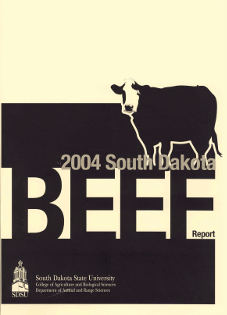Document Type
Report
Report Number
2004-13
Publication Date
2004
Summary
The effect of ranch management on weaning and relocation stress was investigated using spring born steer calves from a single source. Steers on mature (≥ 4 yr of age) dams were weaned at shipment (NW) whiles steers on young (< 4 yr of age) dams had been weaned and on feed at the ranch for 1 mo prior to shipment (PW). At shipment tympanic temperature (TT) loggers, an indicator of body temperature, were placed in 13 steers from each management group at shipment. Steers were transported together to the SDSU Research Feedlot (365 mi). Body weight after 21 d in the feedlot (670 vs 673 lb) and DMI (14.7 vs 14.9 lb) were similar (P > 0.10) between PW and NW steers, respectively. Average daily gain (2.66 vs 3.17 lb) and feed efficiency (5.53 vs 4.74 lb) were higher (P < 0.05) in NW steers. NW steers recorded higher TT (1.2 ºF; P < 0.05) than PW steers duing loading and transportation from the ranch, indicating a greater initial stress associated with NW. During the first 4 d at the feedlot DMI was lower for NW steers (11.2 vs 6.1 lb) and was slightly below maintenance. There were no differences (P > 0.05) in TT associated with this period of negative energy balance. Results indicate that pre-transit weaning, as a part of feedlot transition, did not add sufficient stress to alter TT compared to previously weaned calves.
Number of Pages
6
Format
application/pdf
Language
en
Publisher
South Dakota State University
Rights
Copyright © 2004 South Dakota State University
Recommended Citation
Holt, Simone M.; Pritchard, Robbi H.; and Wittig, Timonthy A., "Impact of Relocation and Weaning Stress on the Feedlot Performance of Steer Calves During the Receiving Period" (2004). South Dakota Beef Report, 2004. 14.
https://openprairie.sdstate.edu/sd_beefreport_2004/14

